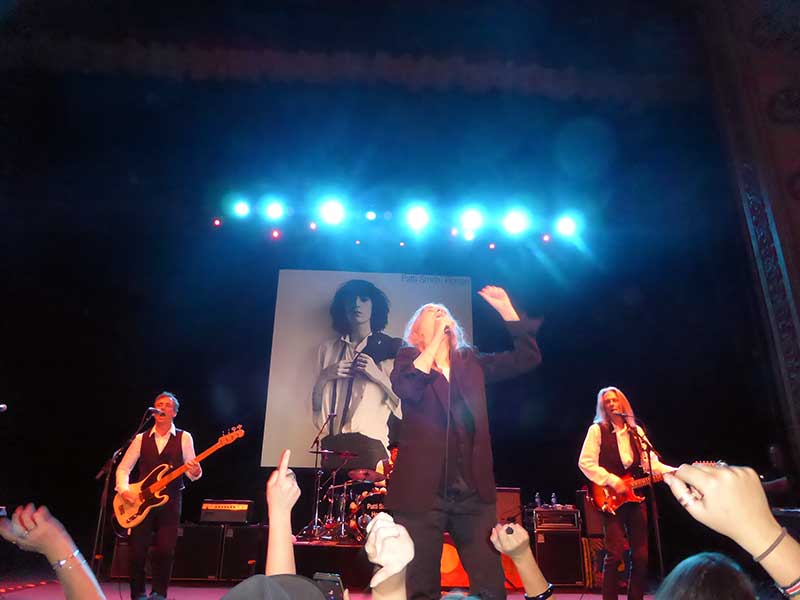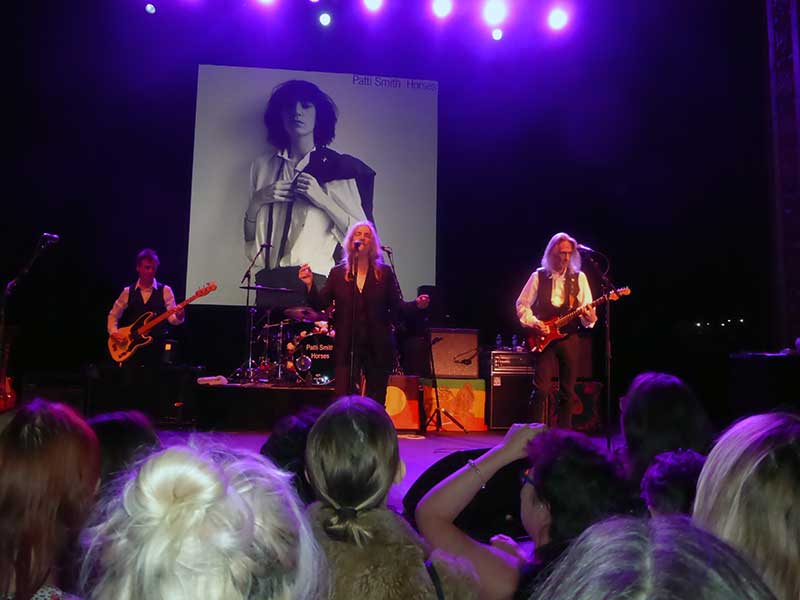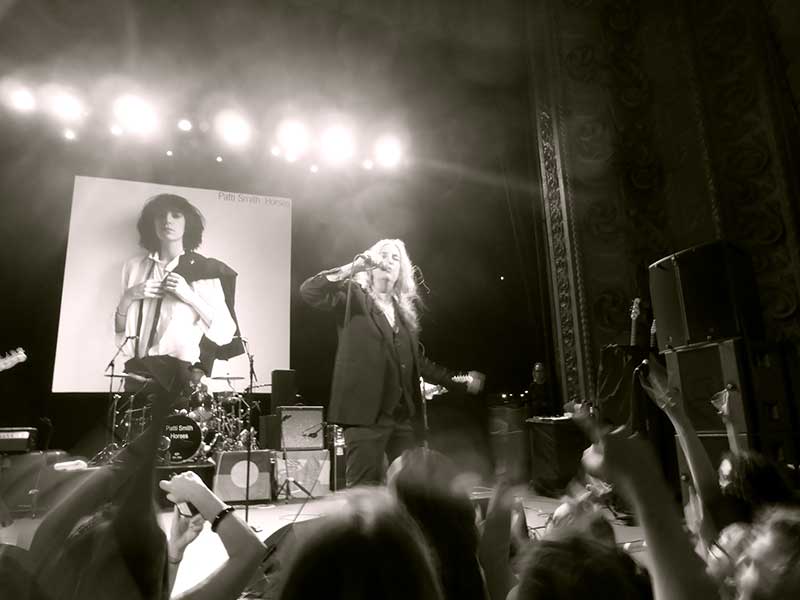
Patti Smith And Her Band
Monday, April 10, 2017
State Theatre, Sydney
Photos by Steve Lorkin
Last Monday was the seventh time I’ve seen Patti live. So I have to place my cards on the table. I am a Patti fan. Patti was always my missing link between my love of Dylan and the Velvets and pure 1977 punk rock.
Patti wrote songs with such amazing poetic vision, yet she was a street-level rocker with a penetrating vision on so many levels. From the brutally tough “Rock n Roll Nigger” to the poetic, sensitive “Elegies”, she has a range of writing that very few can match. Her first four albums stretch from explosions of primal rock (“Radio Ethiopia”) to sensitive, spiritual mantras and hymns. Then all I remember is that Patti disappeared.
Patti stayed on in my consciousness in the ‘80s. Patti was the mysterious artist whose legacy of albums and poetry books dominated my book shelves. Then there was another album, “Dream Of Life”, in 1988 and she disappeared again.
A decade later she returned. “Gone Again” was the new album and I cherished the dark passages and emotive hymns dealing with the death of her husband, Fred “Sonic” Smith.
At the same time, Dylan re-awakened on a creative level with “Time Out of Mind”. It was damn exciting with Bob and Patti touring Australia together on the same bill.
I went to three of the shows. Patti was visionary and it was my live introduction to her. It was the Wollongong show where I saw the incredible aura she had as an artist, even as a support act. She had the crowd in her palm when she asked them to be seated and, like Moses, walked among them as they parted like a sea.
That was 20 years ago and I am now clutching my fourth row ticket to the Monday night Sydney show of her tour with pride. Tonight it will be the debut album “Horses” album played completely, from start to finish.
The John Cale-produced “Horses” is simply an amazing album, an iconic combination of simplicity, rock passion and lyrical vision. It owes as much to Rimbaud as Beat culture and sounds like the love child of Dylan and garage rock.
Patti was never going to cut through middle America with her opening line: “Jesus died for some sins but not mine.”.
That line is up there with the most significant counter culture lyrics. I place it with Ginsberg’s: “I saw the best minds of my generation destroyed by madness, starving hysterical naked, dragging themselves through the negro streets at dawn looking for an angry fix angel headed hipsters burning for the ancient heavenly connection to the starry dynamo in the machinery of the night.”
I believe Patti never rejected her spirituality and core Christian beliefs with that line. It was a rejection of her upbringing, as Smith was raised in the cult of the Jehovah’s Witnesses. This frigid and strict regime preaches a form of religious dogma that shuns women’s sexuality and expression and raises girls to be submissive.
Patti ran away and escaped that world in her mid-teens and by the late ’60s, she’d found Rock ’n’ Roll. Patti also found her poetic heroes. Patti found Manhattan. The rest is Rock ’n’ Roll history. She made connections to the Velvet Underground, the Stooges and the MC5. There were other influences - like Warhol, the shadow of Dylan and the experience of living on the fringe with misfits, writers, artists and junkies in the Chelsea Hotel. That artistic breeding ground shaped her to break through the walls and make her benchmark albums.
The other important element was the formation of her musical partnership with Lenny Kaye, a man who lived and breathed Rock ’n’ Roll. It was the perfect artistic partnership. They created one of most influential records recorded in the past 50 years, “Horses”.
As Patti wrote at the time, her vision with “Horses” was "to make a record that would make a certain type of person not feel alone. People who were like me, different ... I wasn't targeting the whole world. I wasn't trying to make a hit record.“
Well thank you Patti.You found me. I am one of the people who don’t feel lonely when I listen to your records.
So I take my seat at the State Theatre. The album will be played in order. The band assembles and the opening line is to be sung: “Jesus died for someone else sins…” and the audience explodes.
The sound is clear as Patti Smith watches on and embraces her audience The band is a classic rock machine with Lenny playing a highly- modified Stratocaster that is stripped back to one pick-up and a single volume knob. Patti is wearing trademark black suit and Doc Martens with her long wild grey hair down to her back.
“Gloria” rocks out into the classic garage rock workout that it is. It’s followed by “Redondo Beach”. The live production of this song is near perfect and it’s rendered just like the version on “Horses”. The song always seemed like a light moment on the album and it’s a soundtrack to Patti’s autobiographical novel, “Just Kids”. There is a sense of innocence to it. Patti’s voice is in fine form and is almost skipping as it plays hopscotch with the melody.
The haunting “Birdland” piano intro starts and the lights are dimmed as Patti whispers the third song - the first real insight into her talent as a wordsmith. She channels rich images as Lenny’s guitar wails amid intricate, chiming piano playing.
“His father died and left him a little farm in New England. All the long black funeral cars left the scene And the boy was just standing there alone Looking at the shiny red tractor Him and his daddy used to sit inside And circle the blue fields and grease the night.”
The opening chords signal the start of “Free Money”. Patti raises her hands as a signal to the audience to surge forward and there’s a frantic rush to the stage. The polite seating arrangements of the theatre are gone and it’s transformed into a real rock ’n’ roll show: I find myself right up the front of the stage, directly in front of Patti and she waves along and touches our hands and glows.
Now I am in seventh heaven as “Free Money” is belted out. I’m caught up in the dancing and it all feels right. Jeez, I hate polite, seated gigs. Tonight has brought out the punk rock kid still within and this felt right. I am not retired yet. This was right.
Patti explains that now it is time to turn the record over and the band bursts into “Kimberly.” The bass cuts in as part of a swagger and shuffle. The organ floats through and swirls. Next, “Break It Up", a song she wrote withTom Verlaine. It’s, introduced with her own memories of Tom, back when that song was written.
“Elegie” closes the album but first, Patti opens up to her audience.

Patti is now 70-years-old, living a lifetime of loss, as she explains. She lost her brother, her parents and then she lists the artists, also departed, that meant so much to her. Jimi Hendrix, John Lennon, Janis and Bowie. As an audience member yells out: “We love Fred Sonic Smith”, Patti stares, smiles and says: “I love Fred, too. He will always be my boyfriend.”
“Elegie” begins and closes the first part of the set on a somber note.
The opening chords of “Because the Night” signal the start of Patti’s only recording to have really charted, almost four decades ago. The piano rolls along with Lenny stepping into into a classic guitar solo mid-song as the audience roars…
Banter and exchanges with the audience continue as Patti shares her water and throws rose pedals. She walks into the crowd, holding hands and touching palms as she shares a sense of ritualism, explaining that it is Passover as she recounts her favourite biblical story.
Patti then says that The State Theatre was one of the last Australian venues Prince played. As a tribute, Patti and band improvise a cover of “When Doves Cry” followed by a startling version of Lou Reed’s “One Perfect Day” that sent chills up my spine. Patti’s delivery is quite tender as she whispers and moans the words.
There many twists and turns in the performance tonight as Patti announces to the audience that it's Iggy Pops birthday. We all knew that, right? (ED: It’s not. It’s actually April 21.) Patti makes it known that we are to be live-streamed to Iggy Pop as we all sing Happy Birthday to him. As that dies down, the piano begins and we’re treated to a slowed-down, soulful interpretation of “Dancing Barefoot” and Lenny swings into an extended guitar solo. Patti has now been on stage for just two hours and they leave.
They’re back. Patti and her band belts out and explosive “My Generation”. Punk rock. It is clear that Patti is channelling something much larger than herself. In 1965, this song was the ultimate teen declaration that we are different and you can all fuck off. Members of the band join in on vocal duties, Lenny lays on a layer of fuzz as the song integrates sonic chaos with overtones of Hendrix.
The lyrics of “Rock ’n’ Roll Nigger” are being shouted over the top.
The band kicks into the song as Patti’s now out of tune guitar as its strings snapped, one by one, leaving only the lower E left. Then she smashes it in tribute to the Who with a wall of feedback of which Sonic Youth would be proud. Patti swings it and as the feedback wails from the one stringed Stratocaster, she hollers:
Outside of society
Outside of society
Outside of society
Outside of society
Nigger, Nigger, Nigger
Outside of society
Patti and her band leave the stage and the house lights turn on…
* * * * *
Why is a Patti concert so special? Why does she give so much? Why do her shows never seem like just another, or by numbers? Or a heritage act? Maybe because Patti has always been an outsider: as mentioned she was raised a Jehovah's Witness. The kids in that cult were often outside the school system with very strict rules. For example, no blood transfers. Maybe her attitudes to art and music are about fighting against the system.
I am not sure if what I said to Jenny Kee that night a decade ago was correct. The spiritual element of Patti’s connection to her audiences or soul consciousness. There are those who walked out of the concert, felt that it was like a religious experience and were claiming it as a spiritual event. That could be within them. Patti once said that “spiritually, one has to have the ability to be lifted up themselves. You can be inspired by a rock 'n' roll song but spirituality is innate. Someone can make you feel good or happy, but the actual framework of spirituality is within you.”
That is the point, as we have a woman on stage who is on a constant journey and is a deep thinker. Reassessing her beliefs as a performer, she is completely engaging, open and honest - and so damn talented.
When exploring other artists who use religious rituals and dogma, there is much more than a sense of theatre and Shakespearian tragedy: the Catholic School boy Nick Cave, for example. Patti’s use of religious symbols and dogma is a personal exploration, and part of her art is reflecting all that is within her.
Rock 'n' Roll meant so much to her growing up, Patti herself remembers being part of the audience. All Patti wants to do now is share and carry on her own experience, and her love of a live performance, with her own song.

 Steve Lorkin photo
Steve Lorkin photo